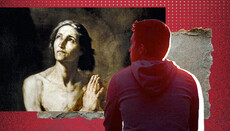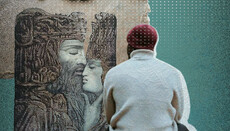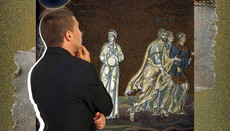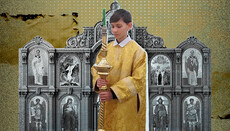Peace in Donbass: OCU and UGCC – a rescue team?
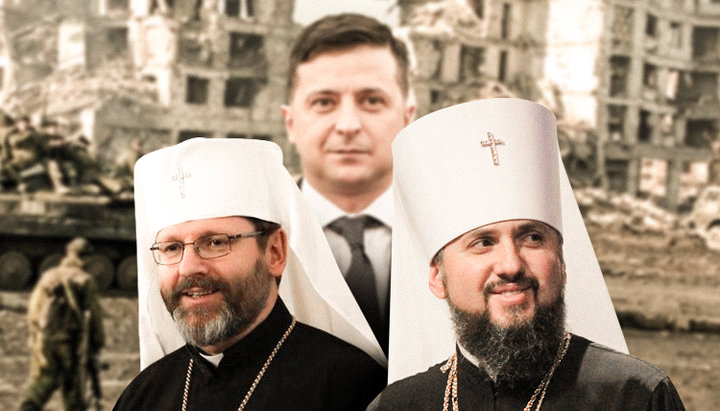
Government representatives believe that the UGCC and OCU heads should be included in the peace talks on the Donbass. But can these people really help bring peace?
On May 18, the people's deputy from the "Servant of the People" Irina Vereshchuk stated that the so-called Trilateral Contact Group on negotiations in the Donbass can include the head of the OCU Epiphany Dumenko and the head of the UGCC Sviatoslav Shevchuk. In her opinion, the participation of these people in peace talks in the Donbass can help solve existing problems. The day before, another government official, the Minister for the Temporarily Occupied Territories of Ukraine Alexei Reznikov said that clergymen could take part in the negotiations. In February 2020, the US State Department announced that the OCU should participate in the reintegration of the Donbass. Are all these statements a coincidence? Can the heads of the OCU and the UGCC really help the peace process, and most importantly, do they themselves strive for peace in the Donbass?
Minsk agreements, creation of the Advisory Council and “engagement” of Epiphany and Shevchuk
The war in the east of Ukraine has been going on for almost 6 years. Almost immediately after its beginning, that is back in the summer of 2014, the so-called Trilateral Contact Group (hereinafter the TCG) was created, which, besides Ukraine, includes the OSCE and Russia. The main task of the TCG is to find a way to peacefully resolve the military confrontation in the Donbass. It was within the framework of the TCG that on September 5, 2014, the Minsk Protocol was signed, which provided, in particular, for a ceasefire in the territory of Donetsk and Lugansk regions of Ukraine. Since then, the Minsk agreements have been repeatedly violated, and all attempts to peacefully stop the war in the Donbass ended in nothing.
And now, with the advent of the new President, the people of Ukraine have a hope that the military confrontation will finally cease, and the Ukrainian government will move from words to deeds.
In October 2019, Sergei Sivokho, who really tried to take practical steps to peacefully resolve the confrontation, became an advisor to the Secretary of the National Security and Defense Council of Ukraine on the reintegration of the Donbass. In his opinion, the Ukrainian Orthodox Church, which can act as a mediator of the peace process, can play a significant role in this matter.
On March 12, 2020, the presentation of the National Platform for Reconciliation and Unity, a centre that brings together state and public initiatives to address the problems in Ukraine, was to take place. However, on the very day of the presentation of the platform, the radicals beat Sergei Sivokho and disrupted the presentation. Commenting on the incident, Sivokho wrote: “Some people do not need peace. They want war. Because war is a business and a lot of money.” On March 20, he was dismissed.
Later it became known that a document on the need to create the Advisory Council that would include representatives of the Donbass uncontrolled territories of Ukraine was signed at a meeting of the TCG on 11 March 2020.
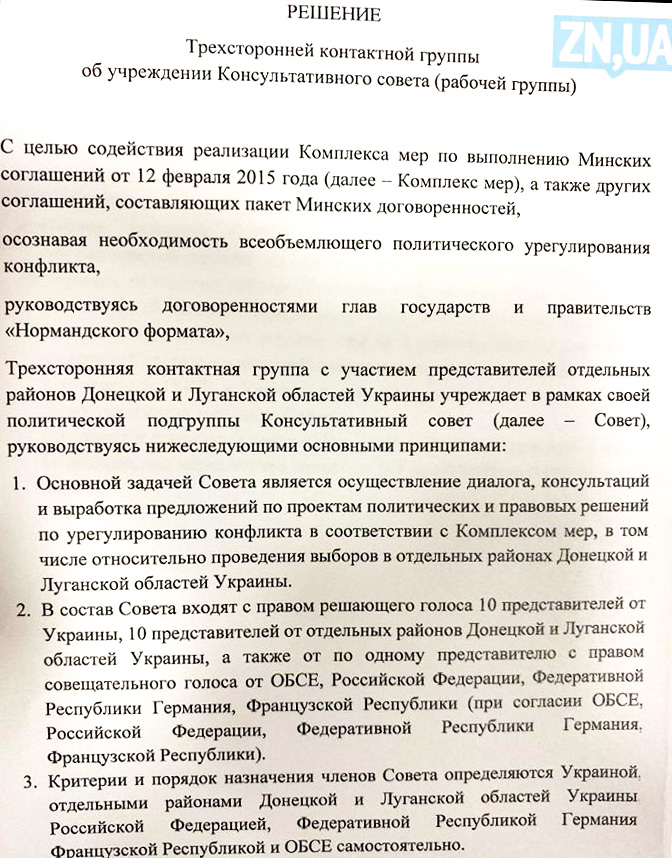

However, it soon became known that instead of representatives of ORDLO (certain areas of Donetsk and Luhansk regions), the Ukrainian side intends to involve migrants living in the controlled territory of Ukraine. At the same time, the opinion of residents of the self-proclaimed republics when choosing people to represent them in the Advisory Council will not be taken into account, contrary to the wording of the document on the creation of the Council. This was reported by the Minister for the Temporarily Occupied Territories of Ukraine Alexei Reznikov.
According to the official, the composition of the Council should include priests, although Reznikov did not specify exactly who he meant. But he made one very important remark: the candidates for peace talks should be selected taking into account the degree of public trust in them on both sides of the demarcation line.
And so, on May 18, Irina Vereshchuk voiced the names of “priests”, who, in her opinion, enjoy trust on both front lines and who will help achieve peace in the Donbass – Sviatoslav Shevchuk and Epiphany Dumenko.
At the same time, the MP emphasized that the authorities "must expand the representation exactly as much as it will be necessary so that it will cause acceptance in the society." She considers Epiphany Dumenko and Sviatoslav Shevchuk religious authorities, who can join the dialogue. Moreover, she is sure that the heads of the OCU and the UGCC "will not harm the cause", and to the host's remark that the presence of these individuals may cause an ambiguous reaction from representatives of uncontrolled territories, the people’s deputy replied that she did not see a problem in it.
Such statements by representatives of the new Ukrainian government are unlikely to be incidental. We cannot help but recall that back in February 2020, the identical message about Epiphany’s participation in the reintegration of the Donbass was given by US Secretary of State Michael Pompeo. During his visit to Ukraine, the head of the State Department discussed with Dumenko the work of the "Metropolitan Fund of the OCU", which supposedly should implement a number of social projects, including those aimed at the reintegration of the Donbass.

Representatives of the Ukrainian authorities are unlikely to have ignored the opinion of “overseas friends” in this matter. But will the participation of the leaders of the OCU and the UGCC really not affect the positive result of the peace talks? After all, those who really want peace must agree on peace. And if you recall at least a small part of what Sviatoslav Shevchuk and Epiphany Dumenko said about the military conflict in the east of Ukraine, then there is every reason to doubt that these people really need peace.
UGCC and the war in Donbass
In one of his recent sermons, already at the time when President Zelensky was actively promoting the peace process, Sviatoslav Shevchuk said: "Only those who think only how to save their own skin are tired of the war in the Donbass". In his opinion, "it is very dangerous when in such circumstances someone speaks of the need to end the war at any cost, neglecting truth and justice". Sviatoslav Shevchuk constantly stresses that he and his supporters "do not need peace in the Donbass at any cost”.
One cannot but remember Shevchuk's rhetoric during the presidential elections a year ago. For the head of the UGCC (the leader of the Church!) the most important quality for the president is to be a good commander-in-chief. Sviatoslav Shevchuk constantly emphasized that it was the commander-in-chief who should be chosen, clearly hinting at Poroshenko: "If we are talking about the President of Ukraine – it is first of all the Supreme Commander-in-Chief of the country, which is de facto at war. You should understand that by choosing the president, you are choosing the one who will command the troops and defend our country. Does this or that candidate have the necessary skills, traits, experience or not?
The head of the UGCC has repeatedly made it clear to Vladimir Zelensky that his structure and the people behind it are not going to give up their principles and are not ready to compromise. Can a person with such sentiments help in peace talks? And most importantly, how will his figure be perceived by the Donbass people, who have been living in a state of war for so many years?
OCU and the war in Donbass
Epiphany's stance on war and peace issues is practically indistinguishable from that of the UGCC and Shevchuk. It can be briefly formulated with a slogan "war to the victorious end".
In his New Year's greetings for 2019, Epiphany wished the Ukrainians "a victorious end to the war in Eastern Ukraine". According to him, "thousands of human lives of the best sons and daughters of our people have already been laid on this altar of independence. Therefore, may the Lord help us go further along the path of truth, which will lead us to complete victory”. Only victory and only war to the victorious end – it is not easy to negotiate peace with such attitude, is it? But further on, Epiphany was very bad at peacemaking.
When Zelensky became president, he asked religious leaders to take part in recording a video message calling for peace. Epiphany was the only one who refused to do so. And the reasoning behind his refusal is very indicative. The head of the OCU was confused by a fragment of the text he was offered to say. He refused to voice the words about the need to stop speaking the language of guns and cannons. Epiphany was afraid that his speech might be perceived as a call for negotiations with ORDLO. The very negotiations that the authorities intend to involve him in now.
Interestingly, Dumenko, like Shevchuk, believes that the main qualities of the president should be the ability to lead the troops and fight back aggression. Just like the head of the UGCC, the OCU leader called at the presidential elections of 2019 to vote not for the person seeking peace but for the commander-in-chief: "The President is the Supreme Commander-in-Chief. Therefore, it depends on our choice to approach victory over the aggressor and achieve not a capitulation to the enemy, which, speaking of peace, is actually called for by some politicians, but a real just peace.” We recall that according to the head of the OCU "just peace" is a war to the victorious end, without any negotiations, let alone compromises with the opposite side.
Metropolitan Mitrofan of Gorlovka and Slaviansk, who has the opportunity to watch the war from the inside, spoke very clearly about the militaristic rhetoric of Epiphany and Svyatoslav Shevchuk: "People who are on the front line, in the trenches, and on both sides, do not want war. Wars are wanted by those who benefit from it. It is a pity that the heads of the OCU and the UGCC are among these people, although they should want another thing".
Elementary logic says that any military action makes strategic sense only in the case of the advancement and having a stronghold in new territories or to counter the enemy's advance.
The war in the Donbass for almost 5 years has been a mutual shelling of enemies in static fortified positions. The shelling, as a result of which civilians often die and suffer.
Now the world is completely transparent for the dissemination of information. Everything Shevchuk and Dumenko said instantly becomes known in the uncontrolled territory of the Donbass – the very one with which the Ukrainian authorities are seeking peace. Let’s ask a question – how do the residents of ORDLO perceive the personalities of the UGCC and OCU heads after all their statements about the need to continue the war?
UOC and peace in Donbass
Paradoxically, Irina Vereshchuk, voicing the names of Shevchuk and Dumenko as possible participants in negotiations with representatives of the self-proclaimed DPR and LPR, for some reason did not name the Primate of the Ukrainian Orthodox Church, His Beatitude Metropolitan Onuphry. But this particular person is a real, not invented religious authority for all residents of Ukraine. The UOC has done incomparably more for peace in the Donbass than all other religious structures of the country combined.
The Church has long proved that its consistent peacemaking position is positively perceived on both sides of the conflict. During all the years of the ongoing conflict, the UOC has been constantly working on the release of prisoners of confronting parties, which is important.
On December 18, 2016, Taras Kolodiy, a paratrooper of Airmobile Brigade 80 was returned from two-year captivity, and on December 27, 2017, the largest exchange of prisoners took place since the beginning of the conflict. Then Kyiv handed over 230 Ukrainian citizens to the self-proclaimed LPR and DPR, and 73 prisoners of war returned to the Kyiv-controlled territory. On August 17, 2019, Metropolitan Onuphry assisted in rescuing another 15 Ukrainian soldiers.
In addition, our Church constantly collects material aid for the Donbass residents, is engaged in charity work in uncontrolled territories, and the hierarchy in their statements constantly emphasize the desire for peace and ending the war in our long-suffering land.
Here are the words of His Beatitude Metropolitan Onuphry: “Our Church condemned both the civil war that began in 1917 and the current one, started with the ‘Revolution of Dignity’. Since 2013, we have called for reconciliation and forgiveness of each other. Only in this way will we preserve the integrity of our country and give it the opportunity to develop. The position of the Church is that it is necessary to end the war and stop killing each other."
Also, during a meeting with President of Ukraine Vladimir Zelensky (attended by Shevchuk and Dumenko), His Beatitude Metropolitan Onuphry spoke not of a “special path”, “a war to the victorious end”, “territories” or “national interests”, but about the value of human life and the importance of the peacemaking process: “Human life cannot be justified or redeemed in any way. the most precious thing in the world. We are grateful to you for starting this peacekeeping mission, and we understand that it is a complex process. But it had to be started – the process cannot succeed unless someone starts it.”
Even from these few examples, it can be concluded that if anyone can help in the peaceful settlement of the conflict in the Donbass, it will only be the Primate of the UOC.
From the very beginning of this war, the Ukrainian Orthodox Church has taken not just a neutral, but a peacemaking position. Our hierarchs, clergy and laity have been trying to reconcile the warring parties. The UOC never speaks of a "war to the victorious end" because there can be no winners in such a war, because She understands that one should speak about love rather than hatred and peace rather than war. Indeed, for the Church, those who live in the West of Ukraine and those who live in the East and in the Crimea are children, not voters and the electorate. Therefore, the Church cannot call for one of Her children to kill another. Our God is the God of peace, not war. And precisely for this reason, the deeds and words of His Beatitude are the deeds and words of the man of peace. And that means that only those who really strive for peace should participate in peace negotiations if, of course, the authorities really need peace.
